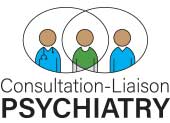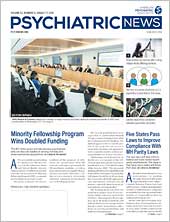Transplant psychiatry is a key area of focus within consultation-liaison (C-L) psychiatry. In the United States, 34,770 solid organ transplants were performed in 2017. While pretransplant psychosocial assessment is an important role, the transplant psychiatrist also provides support to patients through the challenges posed by transplantation, from end-stage organ disease to posttransplant adaptation.
The following case illustrates the full scope of C-L psychiatrists’ transplant care: C-L psychiatry was consulted to see Mr. J, a 55-year-old man with cystic fibrosis, due to anxiety related to respiratory failure and placement on the lung transplant waiting list.
•
Pretransplant anxiety secondary to medical condition: Mr. J described anxiety precipitated by any movements making him feel short of breath and developed worried anticipation of any future physical activity. He was assessed to be an appropriate transplant candidate from a psychiatric perspective. He was diagnosed with anxiety due to a general medical condition and was treated with a combination of mirtazapine, gabapentin, guanfacine, and supportive psychotherapy. However, his respiratory failure progressed, and he required intubation and placement on extracorporeal membrane oxygenation.
•
Postoperative delirium: Two months after he was initially seen by psychiatry, Mr. J underwent bilateral lung transplantation. Postoperatively, he became confused, disoriented, and paranoid. He believed that his hand was cut off and that his nurse was trying to kill him and remove his organs. Extreme restlessness necessitated soft restraints. Haloperidol was added for treatment of delirium, which subsided within a week. Subsequently, guanfacine and haloperidol were tapered off, and he was discharged one month after his transplantation.
•
Acute stress disorder/posttraumatic stress disorder related to transplant (PTSD-T): During outpatient follow-up a week after discharge, Mr. J shared experiencing haunting images dating back to his delirium experiences. He avoided certain shows on TV that made him feel claustrophobic. He thought of future hospitalizations with terror. He initially declined required bronchoscopy due to his new fears and anxiety, but he was able to complete this procedure with psychological support from psychiatry and pretreatment with lorazepam before the procedure.
•
Posttransplant depression: Two months after his transplant, Mr. J felt depressed and hopeless and had decreased enjoyment of any activity. In fact, he wished at times he had not elected lung transplant. His mirtazapine was increased and bupropion started while psychotherapy continued. Within several months, his depression subsided, procedures became easier, and he eventually had resolution of PTSD-related flashbacks.
•
Discussion: This case highlights the scope and important role that C-L psychiatrists play in patients’ transplant journey. Anxiety is common in patients awaiting lung transplantation, due to a combination of physiological changes (that is, hypercapnia, hypoxemia) and psychological/existential reactions to the transplant experience. Data suggest that almost 40 percent of patients undergoing lung transplant evaluation have an anxiety disorder. While anxiety disorders are typically not a contraindication to transplantation, they can have significant impact on the transplant course, and effective interventions from the transplant psychiatrist can facilitate the process. When treating this medically vulnerable population, psychiatrists need to have expertise in selecting efficacious psychiatric treatments, while also mitigating potential adverse effects of psychotropic agents and drug interactions. For example, benzodiazepines are often avoided in the peritransplant period due to risks of respiratory depression and cognitive side effects. Therefore, Mr. J was treated with a combination of mirtazapine, gabapentin, and guanfacine to avoid use of benzodiazepines for his anxiety.
Posttransplant, Mr. J developed delirium, which occurs in approximately 40 percent of lung transplant recipients. C-L psychiatrists working in transplant psychiatry must be able to untangle the multiple factors contributing to delirium in transplant recipients in addition to their surgery status and prolonged hospital stay, including high-dose immunosuppressants (for example, steroids, calcineurin inhibitors), use of opiates, the presence of primary graft dysfunction, posttransplant renal insufficiency, or syndromes such as posterior reversible encephalopathy syndrome.
Mr. J also developed symptoms of PTSD-T, which afflicts approximately 15 percent of transplant recipients. The experience of end-stage disease, a prolonged hospital stay before and after transplant, surgery itself, and multiple painful experiences and interventions are certainly traumatic. Delirium and his memory of his psychotic experiences might have also been additional risk factors for Mr. J. Therefore, C-L psychiatrists must be well versed in assessing these multiple factors precipitating and perpetuating PTSD-T and effectively treat these distressing symptoms often interfering with posttransplant care.
Depression is even more common, occurring in 25 to 30 percent of patients within two years of cardiothoracic transplantation. Posttransplant depression not only severely affects patients’ quality of life, but also has a negative effect on clinical outcomes, including decreased patient survival.
C-L psychiatrists are well positioned to consider the potential impact of various medications used in transplant patients. The neuropsychiatric effects of immunosuppressants and potential effects of other medications used in transplant, such as pain medications and antibiotics, can further contribute to psychiatric sequalae in transplant patients. C-L psychiatrists caring for transplant patients are constantly anticipating the effects of psychiatric medications on immunosuppressant levels, which may increase the risk of rejection (if levels are decreased) or adverse side effects (if levels are increased). Furthermore, transplant medications may also alter levels of some psychotropic medications, thus limiting the efficacy of psychiatric treatment posttransplant or causing side effects. In liver and kidney transplant recipients, functioning of the new graft may vary, and psychiatrists must consider the metabolism route of the medications when using psychotropic medications. Mr. J’s psychiatrist considered these factors during the posttransplant phase and optimized his treatment in response to these factors.
In summary, this case illustrates the critical role C-L psychiatrists have in the acute and long-term care of transplant patients. Specialized psychiatric care for this patient population is needed to better support patients and to treat emerging psychiatric comorbidities during the pre- and posttransplant journey. ■


